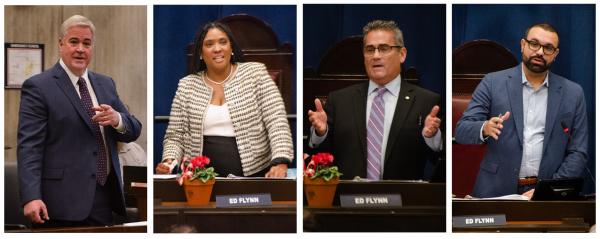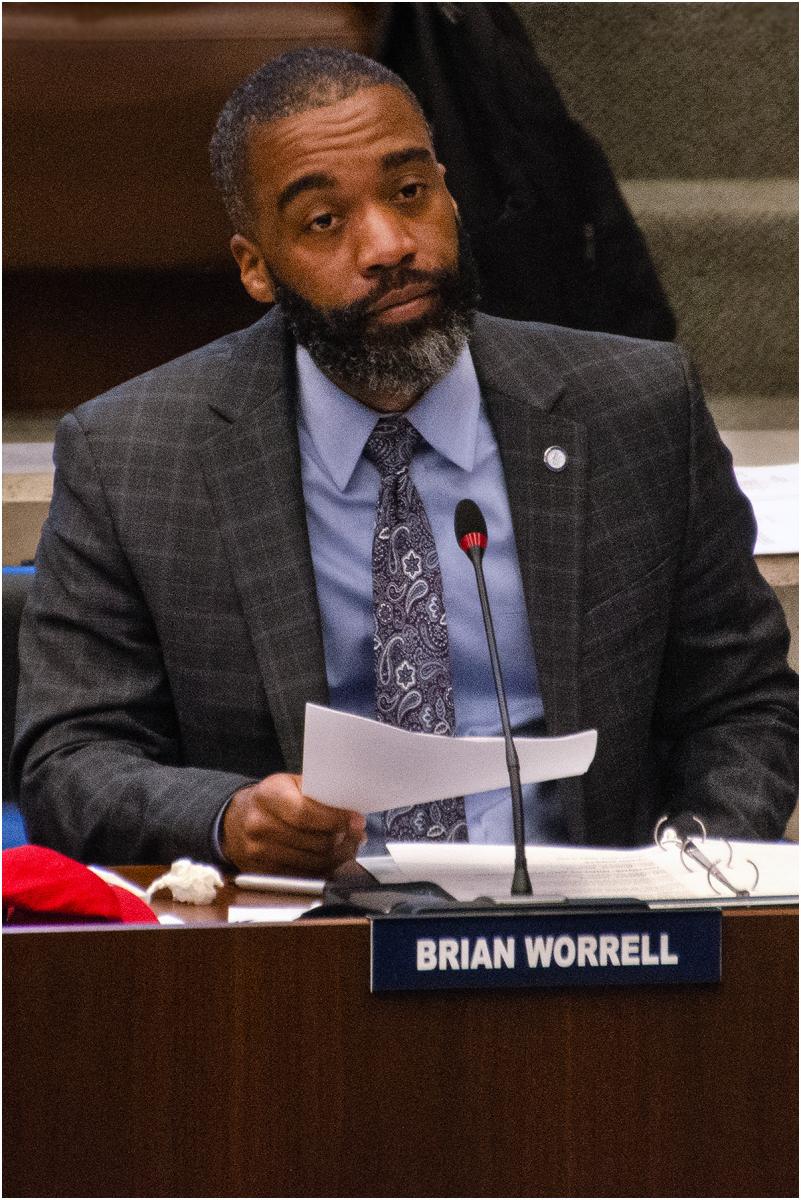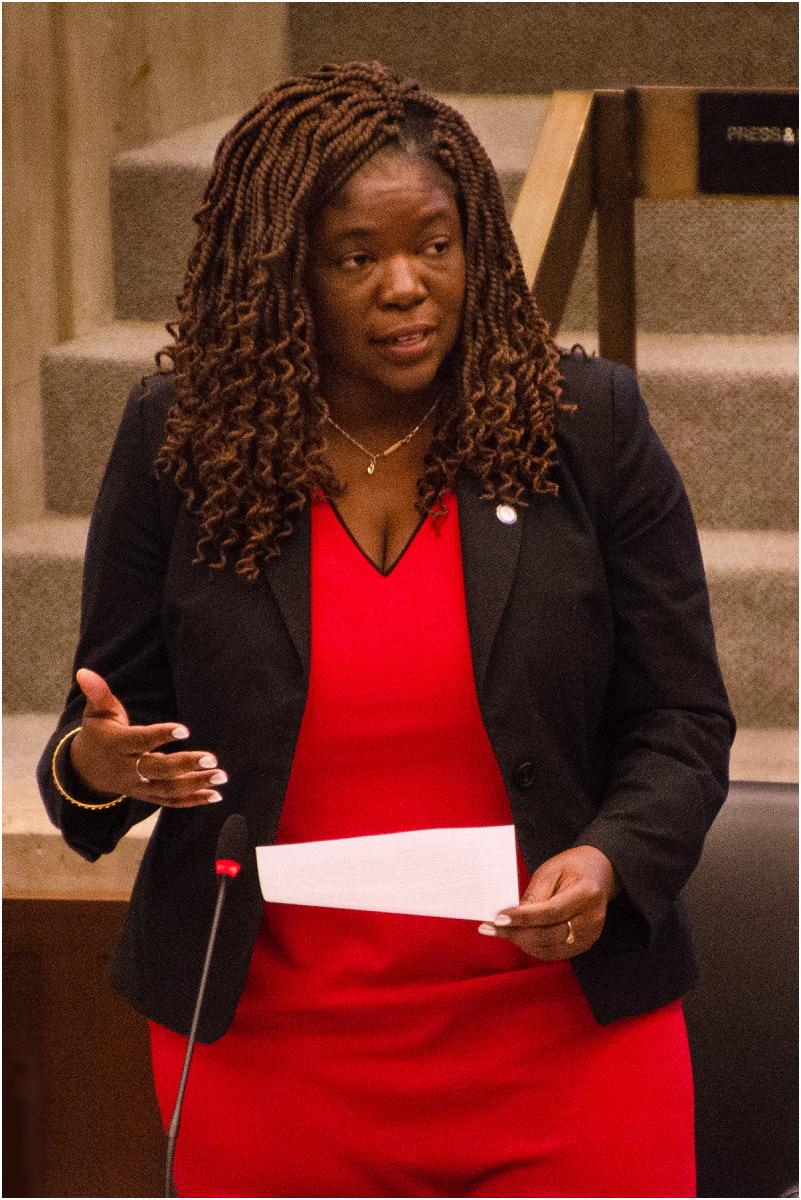December 20, 2023

Out-going City Councillors, from left: Michael Flaherty, Kendra Lara, Frank Baker, and Ricardo Arroyo. Chris Lovett photos
Boston City Council meetings typically start with an invocation by a member of the clergy. So it was on Wed., Dec. 13, the date of the last meeting of 2023, with Rev. Joseph M. White, the pastor of St. Joseph’s Church in the West End, appealing to a multi-denominational quorum of deities for wisdom.
“Our world is very troubled,” he said from the rostrum in the Iannella Chamber, lamenting to the higher powers that “we are more and more polarized.”
It was that kind of year on the Boston City Council.
In November, Boston voters elected four new councillors. Last week, their predecessors – two stepping down and two eliminated in the September preliminary election – extended the custom of farewells. In recognition of their service, Mayor Wu visited the chamber to present them with inscribed Paul Revere Bowls and pose for group photos. But this year, not even the sheen of ceremony could efface the underlying wear and tear on the members.
“I know it isn’t an easy time – ever, maybe – to be in the public eye,” the mayor acknowledged, “but especially lately, just in the environment that we all are in today. From the national level on down, it is a sacrifice.”
By the end of last week, Boston’s environment included controversy, mainly among commentators on social media, about whether it was proper to have a holiday party – a regular seasonal gathering not funded by taxpayers – for elected officials of color and their significant others at the Parkman House. But, at the council meeting on Wednesday, the focus was on other things.
Before the parting speeches, councillors acted on several agenda items. Among the actions were 12-0 votes to approve additional spending for the new five-year contract with the Boston Police Patrolmen’s Association (BPPA). The decision avoided the risk of having a settlement by arbitration, and its supporters included councillors who had voted two months earlier against authorization of a federal grant for the police unit that oversees a controversial gang database.

Councillor Worrell
One opponent of the grant, District 4 (Dorchester/Mattapan) Councillor Brian Worrell, hailed the contract for reforms concerning detail policy and police misconduct. “Many administrations have sought these reforms and were unsuccessful,” he posted on the social media site X, “so I’m grateful to the current administration and the union representatives for their efforts in creating these common-sense reforms.”
There was less agreement when the council voted 8-4 in favor of a home rule petition that would give legal Boston residents without US citizenship the right to vote in city elections. If signed by Wu, the petition would still have to win approved at the State House, where it could face strong opposition.
According to a report last year by the Boston Planning and Development Agency (BPDA), non-citizens account for 15 percent of the population in Dorchester. The same report counted almost 93,000 non-citizens in Boston who were at least 18 years old, and almost $28 million in property taxes paid by the city’s non-citizen homeowners. An earlier BPDA report showed that documented immigrants without US citizenship accounted for 9 percent of Boston’s population.
Among the four councillors from Dorchester, the votes on the home rule petition were split. Voting in favor were Councillor At-Large Julia Mejia and Brian Worrell. Opposed were At-Large Councillor Erin Murphy and District 3 (Dorchester) Councillor Frank Baker.
Another councillor at-large, Michael Flaherty, argued that the measure could result in confusion, even legal problems, for non-citizen voters. In explaining his “yes” vote later, Worrell cited his grandparents from Jamaica and a father from Barbados.
“I think it’s very important,” he said, “that the people that are contributing and helping our city grow, and that are paying taxes in our city, and helping individuals and volunteering in our city, and supporting neighborhoods and organizations … have the ability to shape who represents them and the policy that represents them as well.”
More than a month before the meeting, and only two days after the final election, Councillor At-Large Ruthzee Louijeune announced that she had secured enough votes to succeed District 2 (South Boston, Chinatown, South End) Councillor Ed Flynn as the body’s new president in 2024. If her position is officialized in January, she will head a council that will have only one member who took office before 2020.
In an interview two days after the meeting, Louijeune reflected on a number of things: “I just think that the last few years have been hard for a number of reasons. We were still grappling with coming out of the pandemic. There were a lot of staff changes. Whenever there’s a member of the body running for another election, that can create some tensions. And so, we have four colleagues who left and we have four new colleagues coming in. I think the tone and culture of the council will be different as a result. I thank again President Flynn for his leadership under difficult circumstances and I look forward to building with my colleagues.”

Councillor Louijeune
A daughter of immigrants, Louijeune was elected two years ago, becoming the first Haitian American to join the council and later winning praise for helping to resolve a contentious divide over the council’s re-districting. In this year’s election, she was the top vote-getter, finishing a half a percentage point ahead of the second-place candidate, Erin Murphy.
Asked about her take-away from the election results, Louijeune said, “I saw a city that’s committed still to progress, that cares about a city council that’s going to work on the nuts and bolts of values of people who have lived experiences that are reflective of the city of Boston, people who are not about the drama and who are not about any political infighting, but who just want to do the work.”
For the coming year, Louijeune said, she wanted more action on housing –protecting residents from displacement and helping to create more affordable units. She also said she wanted the council to push for more accountability from the Boston Public Schools.
After 29 people were displaced by a fire on Ellington Street on November 25, Worrell and his staff have been helping with relief, setting up a fund and handling items donated to families. Also helping was his brother, State Rep. Chris Worrell.
In recent weeks on social media, the councillor hailed a recent decision by Boston Medical Center to scale back its plans for recovery and mental health facilities on the site of the Shattuck Hospital, which lies just outside his district, but is of concern to many of its residents. He has also tried to mobilize relief efforts for the 29 people displaced by the Nov. 25 fire on Ellington Street.
In other posts, Worrell saluted the 2023 National Pop Warner Champions, the Dorchester Elite Eagles, and their cheerleaders. The feat was celebrated locally by a parade at a time when football teams in the Boston Public Schools face new challenges, including changes in access to fields for games and practice. And Worrell noted that students in Boston lack some of the athletic programs that were available to him as a METCO student in Lincoln-Sudbury.
“But most of my policy goals are focused on either public safety or economic empowerment and economic development,” said Worrell. “And that’s where I think I’ll be able to bring some really big ideas to the table in 2024 that reflect what our community and constituents need.” Among the ideas: more housing developed as condos for ownership and wealth building, and more diversity in city contracts.
The first departing member to formally bow out on Wednesday was Michael Flaherty. First elected to the council in 1999, he went on to serve for a total of 20 years. The son of a former state representative from South Boston, he shared his mother’s advice about constituents asking for help: Always call them back.
“It may be a big issue or a small issue,” said Flaherty, “but it’s the most important issue in that person’s life or their family’s life, and taking a couple of minutes to return the phone call – you may still have to call someone to get the answers for them – you may have to do a little more work on it, but at least you called, letting them know you’re on it.”
Flaherty also reminded councilors about the ability to get things done by working with partners outside of City Hall, such as local institutions.
“Working those partnerships, working those relationships, is what makes our city great,” he said. “I would suggest that we need to do a little more of that here on the council, working together, getting to know each other a little better, rolling up our sleeves, be willing to broker compromise. You don’t always have to have a whole loaf, you can have a half loaf, a quarter of a loaf, and still make sure that we’re moving our city forward.”
In his farewell remarks, Frank Baker recalled efforts by his parents to help people in the community get access to health care and follow through with recovery programs. He said he decided to run for the open seat in District 3 in 2011 because he felt his neighborhood had been under-served.
A central figure in contentious debate over redistricting, Baker also acknowledged that he was once asked by a reporter how he could enjoy a job in which he seemed angry.
“I said, ‘Of course I’m angry. Whatever. I still love my job,’” Baker said from the rostrum. “I love helping the people of Boston. I love being able to call governor, senators – the people to help people that don’t have a voice.”
Two days later, the sentiments expressed by Baker and Flaherty found some agreement from younger colleagues.
“I look forward to building bridges and working with the council to deliver the nuts and bolts of constituent services,” said Worrell, “and also creating policy, changing structures inside the city of Boston that work for all parts and everyone. So collaboration, making sure that we are setting the right example and also making sure that, every day, we show up for this job.”
Said Louijeune: “If you don’t show up and serve people’s everyday lives, to reduce the stress or help solve a problem, they’re not going to trust you with the bigger issues that come across your desk. So, it’s super important to return every phone call, to return emails, to be ready and available for those who are in need.”


